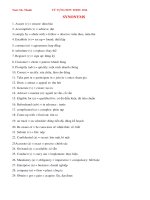TỪ VỰNG TOEIC unit 20
Bạn đang xem bản rút gọn của tài liệu. Xem và tải ngay bản đầy đủ của tài liệu tại đây (262.63 KB, 62 trang )
Unit 20
NOM PATER/PATR LEGA GREG FLU PREHEND/PREHENS TEMPER
PURG MILL HEMI/SEMI Number Words
Quiz 20-1 Quiz 20-2 Quiz 20-3 Quiz 20-4 Quiz 20-5 Review Quizzes 20
NOM comes from the Latin word for “name.” A nominee is a person
“named”—or nominated—to run for or serve in office. A binomial (“two
names”) is the scientific name for a species: Felis catus for the house cat, for
example. A polynomial, with “many names,” is an algebra expression
involving several terms: 2x2 + 9y – z3, for instance.
nominal
(1) Existing in name or form only and not in reality.
(2) So small as to be unimportant; insignificant.
• The actor himself was the nominal author, but 90 percent of the prose was
the work of his ghostwriter.
Something nominal exists only in name. So the nominal ruler in a
constitutional monarchy is the king or queen, but the real power is in the
hands of the elected prime minister. In the United Kingdom, the British
monarch is also the nominal head of the Church of England; and those
baptized in the Church who aren't really churchgoers might be called nominal
Christians. A fee can be called nominal when it's small in comparison to the
value of what it buys. So, for example, you might sell a friend a good piece of
furniture for a nominal amount. And the charge for a doctor's visit might be a
nominal $20, since most of the cost is covered by an insurance plan.
nomenclature
(1) A name or designation, or the act
of naming. (2) A system of terms or symbols used in biology, where New
Latin names are given to kinds and groups of animals and plants.
• Naming newly discovered plants or animals requires close study of the
system of nomenclature.
Various specialized fields have their own particular nomenclatures, or sets of
terms. In particle physics, for instance, the elementary particles known as
quarks, which are believed to come in pairs, have acquired such names as
“up” and “down,” “strange” and “charm,” and “truth” and “beauty”—which
is all most of us know about quarks and all we need to know. But
nomenclature is used most often for the system of biological classification
created by Linnaeus. In Linnaeus's system, each species has its own twoword name, the first word being the name of its genus. Thus, the genus Equus
includes the horse (Equus caballus) and the mountain zebra (Equus zebra).
But since broccoli, cauliflower, and cabbage actually all belong to the same
species (Brassica oleracea), they each need a third name to distinguish
themselves.
ignominious
(1) Marked with shame or disgrace;
dishonorable. (2) Humiliating or degrading.
• If Attila the Hun was truly murdered by his bride on their wedding night, it
was a most ignominious death for a warrior.
The Latin nomen could mean both “name” and “good reputation,” and even
today we can say that someone who has been disgraced has “lost his good
name.” With its negative prefix ig-, ignominious indicates the “namelessness”
that goes with shame or dishonor. A person who suffers an ignominious fate
may die nameless and forgotten. In the former Soviet Union, party leaders
who fell out of favor, even if they avoided being imprisoned or executed,
became nonpersons. Their names were removed from official records and
history books and they were treated as if they had never existed.
misnomer
A wrong name, or the use of a wrong name.
• Calling the native peoples of the western hemisphere “Indians” was one of
the great misnomers in recorded history.
Historians have long noted that the Holy Roman Empire in its later years was
neither holy, Roman, nor an empire. The Battle of Bunker Hill was actually
fought on nearby Breed's Hill. And the famous Woodstock Festival was
actually held in the town of Bethel. But misnomers aren't limited to history.
The Pennsylvania Dutch are actually of German ancestry. Koala bears aren't
bears—they're marsupials. And in the world of food, the Rocky Mountain
oyster, as diners have sometimes discovered too late, aren't really oysters.
PATER/PATR comes from both the Greek and the Latin word for “father.”
So a patron, for example, is someone who assumes a fatherly role toward an
institution or project or individual, giving moral and financial support.
patrician
A person of high birth or of good breeding and
cultivation; an aristocrat.
• They passed themselves off as patricians, and no one looked too closely at
where their money came from.
A patrician was originally a descendant of one of the original citizen families
of ancient Rome. Until about 350 B.C., only patricians could hold the office
of senator, consul, or pontifex (priest). Later, the word was applied to
members of the nobility created by the Roman emperor Constantine. As time
went by, other nobles, such as those in medieval Italian republics and in
German city-states, also came to be known as patricians. Today someone's
appearance, manners, or tastes can be described as patrician, whether the
person is actually of high birth or not. The actress Grace Kelly, an
immigrant's daughter, was admired for her patrician beauty even before she
became Princess Grace of Monaco, with classic features worthy of ancient
Rome's finest sculptors.
patriarchy
(1) A family, group, or government controlled
by a man or a group of men. (2) A social system in which family members
are related to each other through their fathers.
• She spent the 1980s raging against the patriarchy, which she claimed had
destroyed the lives of millions of women.
With its root -arch, meaning “ruler, leader,” a patriarch is a man who
dominates something, even if it's just a family. In Christianity, the term is
used for a few leading figures who appear early in the Old Testament,
including Methuselah, Abraham, Isaac, and Jacob; in the Eastern Orthodox
church, a patriarch is usually the equivalent of a bishop. Outside of the field
of anthropology, patriarchy didn't start to be used much until the 1970s,
when the women's movement gained a huge following. Many feminists have
claimed that all Western societies are patriarchal—that is, that they
systematically enable men to dominate women. But there's plenty of
disagreement about how this is done, and the word isn't discussed as often as
it used to be.
expatriate
A person who has moved to a foreign land.
• As he got to know his fellow expatriates in Morocco, he found himself
wondering what had led each of them to leave America.
Expatriate combines the prefix ex-, “out of” or “away from,” with the Latin
patria, “fatherland.” A famous colony of expatriates was the group of writers
and artists who gathered in Paris between the two world wars, including
Ernest Hemingway, F. Scott Fitzgerald, and Gertrude Stein. Unlike an exile
or an emigrant, an expatriate's residence abroad is usually voluntary and
extended but not permanent, and expatriates—often called expats—generally
keep their original national identity and eventually end their self-imposed
exiles by repatriating themselves.
paternalistic
Tending to supply the needs of or regulate
the activities of those under one's control.
• Some still accuse the university of being too paternalistic in regulating
student living arrangements.
A good father shows paternal concern about his children, just as a good
mother often acts out of maternal feeling. But paternalistic has a negative
sound nowadays, since paternalistic people or institutions seek—often with
decent intentions—to control many aspects of the lives of those under their
control. In the 19th century, mill owners actually often provided cheap
housing for the mill's employees. Today companies frequently have strict
rules regarding personal appearance, or against marriages within the
company. Colleges and universities used to practice a kind of paternalism,
especially in trying to keep men and women out of each other's dorms, but a
changing society has mostly put an end to that.
Quiz 20-1
A. Fill in each blank with the correct letter:
a. patriarchy
b. misnomer
c. expatriate
d. nominal
e. ignominious
f. paternalistic
g. nomenclature
h. patrician
1. It's a community pool, and the fee we pay each time we use it is only ___.
2. At Christian colleges, policies tend to be rather strict and ___.
3. “Friend” is a ___ for Charlotte; “rival” is more like it.
4. The country could still be called a ___, with men being completely
dominant both at home and in the government.
5. The first public attempts to test the antiballistic missiles ended in ___
failure.
6. He soon discovered that he wasn't the only American ___ living in the
Guatemalan village.
7. The person who discovers a previously unknown plant usually gets to
name it, but the ___ must follow a strict set of rules.
8. His family and upbringing were ___, but he still considered himself a man
of the people.
Answers
B. Match the word on the left to the correct definition on the right:
1. paternalistic a. wrong name
2. nomenclature b. aristocrat
3. patriarchy
c. exercising fatherly authority
4. misnomer
d. rule by men
5. expatriate
e. naming system
6. nominal
f. humiliating
7. ignominious g. in name only
8. patrician
h. person living abroad
Answers
LEGA comes from the Latin legare, meaning “to appoint” or “to send as a
deputy.” The same root actually shows up in such words as legal—but how
the law connects with sending deputies can get awfully complicated and
probably isn't worth going into.
legate
An official representative, such as an ambassador.
• All the important European powers sent legates of some kind to the peace
conference.
Legate is a somewhat old-fashioned word, less used today than it was a
century ago. More common is the synonym envoy. In the days before
electronic communications, a legate often had particularly large
responsibilities, since he couldn't check with his government to be sure he
was doing the right thing. The Vatican still sends papal legates to represent
the pope's point of view in negotiations.
legacy
(1) Something left to a person in a will. (2) Something
handed down by an ancestor or predecessor or received from the past.
• The Stradivarius family of violin makers left a priceless legacy of
remarkable instruments.
In its basic meaning, a legacy is a gift of money or other personal property
that's granted by the terms of a will—often a substantial gift that needs to be
properly managed. But the word is used much more broadly as well. So, for
instance, much of Western civilization—law, philosophy, aesthetics— could
be called the undying legacy of ancient Greece. And the rights and
opportunities that women enjoy today are partly the legacy of the early
suffragists and feminists.
delegation
A group of people chosen to represent the
interests or opinions of others.
• Each American colony sent a delegation to the Second Continental
Congress, and in its second year all 56 delegates approved Jefferson's
Declaration of Independence.
The task of a delegation—each member of which can be called a delegate—is
to represent a larger group, often at a conference. Thus, a delegation of
nondoctors to a medical convention may want to make sure the rights and
needs of patients aren't ignored, just as a delegation of laypeople may attend a
religious conference to express the concerns of other laypeople.
relegate
(1) To remove or assign to a less important place. (2)
To refer or hand over for decision or for carrying out.
• First-year students were relegated to the back of the line so that all the upper
classes could eat first.
Originally relegate meant “to send into exile, banish.” So when you relegate
an old sofa to the basement, you're sending it to home-decorating Siberia.
When confronted with a matter that no one really wants to face, a chief
executive may relegate it to a committee “for further study,” which may
manage to ignore it for years. It may be annoying to read a newspaper article
about a pet project and find that your own contributions have been relegated
to a short sentence near the end.
GREG comes from the Latin grex, “herd” or “flock.” Bees, starlings, cows—
any creatures that like to live together in flocks or herds—are called
gregarious, and the same word is used for people who enjoy companionship
and are happiest when they're in the middle of a rowdy herd.
aggregate
A collection or sum of units or parts.
• His lawyers realize that the aggregate of incriminating details is now
pointing toward a conviction.
An aggregate is often an example of something being greater than the sum of
its parts. For instance, even if no individual element in a person's background
would assure a criminal career, the aggregate of factors could make a life of
crime seem unavoidable. Aggregate is often used in the phrase “in the
aggregate,” as in “Her achievements were, in the aggregate, impressive
enough to earn her a scholarship.” Aggregate is also an adjective, meaning
“total”; so, for instance, economists often discuss aggregate demand for
goods and services in the country's economy, just as you yourself might
speak about your father's aggregate income from his three jobs.
congregation
(1) A gathering of people, especially for
worship or religious instruction. (2) The membership of a church or temple.
• That Sunday the congregation was especially large, and the minister
delivered one of his best sermons.
The verb congregate may be used for spontaneous gatherings. A crowd
quickly congregates at the scene of an accident, for example, just as cows,
sheep, or horses tend to congregate during a storm. And under military rule,
citizens are often forbidden to congregate on street corners or anywhere else.
But a congregation is generally a group that has gathered for a formal
purpose, usually in church. The Congregational Church was originally the
church of the Puritan settlers, in which each congregation governed its own
church independent of any higher authority.
egregious
Standing out, especially in a bad way; flagrant.
• Many of the term papers contained egregious grammatical errors.
Since egregious begins with a short version of ex-, meaning “out of,” the
word should mean literally “out of the herd.” So something egregious
possesses some quality that sets it apart from others. Originally, that
distinguishing quality was something good, but by the 16th century the
word's meaning had taken a U-turn and the word was being applied to things
that were outrageously bad. This has remained the most common sense.
Thus, an egregious fool is one who manages to outdo run-of-the-mill fools,
and egregious rudeness sets a new standard for unpleasant salesclerks.
segregate
(1) To separate from others or from the general
mass; isolate. (2) To separate along racial lines.
• Some schools are experimenting with gender segregation, claiming that
both sexes learn better in classrooms from which the other sex is absent.
The prefix se- means “apart,” so when you segregate something you set it
apart from the herd. The word typically means separating something
undesirable from the healthy majority. During the apple harvest, damaged
fruit is segregated from the main crop and used for cider. In prisons, hardened
criminals are segregated from youthful offenders. Lepers used to be
segregated from the general population because they were thought to be
highly infectious. The opposite of segregate is often integrate, and the two
words were in the news almost daily for decades as African-Americans
struggled to be admitted into all-white schools and neighborhoods.
Quiz 20-2
A. Complete the analogy:
1. habit : custom :: legacy : ___
a. descendant b. tradition c. transit d. deputy
2. obedient : tame :: egregious : ___
a. crowded b. uncrowded c. blatant d. fair
3. governor : executive :: legate : ___
a. letter b. priest c. deputy d. bandit
4. series : sequence :: aggregate : ___
a. individual b. collection c. attack d. annoyance
5. flock : group of sheep :: delegation : ___
a. group of candidates b. group of worshippers c. group of runners
d. group of representatives
6. tear : mend :: segregate : ___
a. mix b. sort c. send away d. refine
7. revise : amend :: relegate : ___
a. vanish b. banish c. tarnish d. varnish
8. location : place :: congregation : ___
a. birds b. whales c. group d. temple
Answers
B. Fill in each blank with the correct letter:
a. congregation
b. relegate
c. segregate
d. delegation
e. legacy
f. aggregate
g. legate
h. egregious
1. The child had tried to hide his mistake with an ___ lie.
2. The king's ___ arrived two weeks early in order to negotiate the agreement
that the king would later sign in person.
3. Battlefield medics were forced to ___ the hopeless cases from the other
casualties.
4. The government is struggling to overcome a ___ of corruption that goes
back a hundred years or more.
5. Taken in the ___, these statistics are very disturbing.
6. At the conference a carefully chosen ___ presented its views to the
president.
7. The ___ grew silent as the first strains of the wedding march sounded.
8. There in the corner, where the shopkeeper had decided to ___ him, sat a
stuffed bear with a mournful face.
Answers
FLU comes from the Latin verb fluere, “to flow.” So a flume is a narrow
gorge with a stream flowing through it. A fluent speaker is one from whom
words flow easily. Influence originally referred to an invisible fluid that was
believed to flow from the stars and to affect the actions of humans. A
mysterious outbreak of disease in 15th-century Italy led Italians to blame it
on the stars' influenza—and the name stuck.









